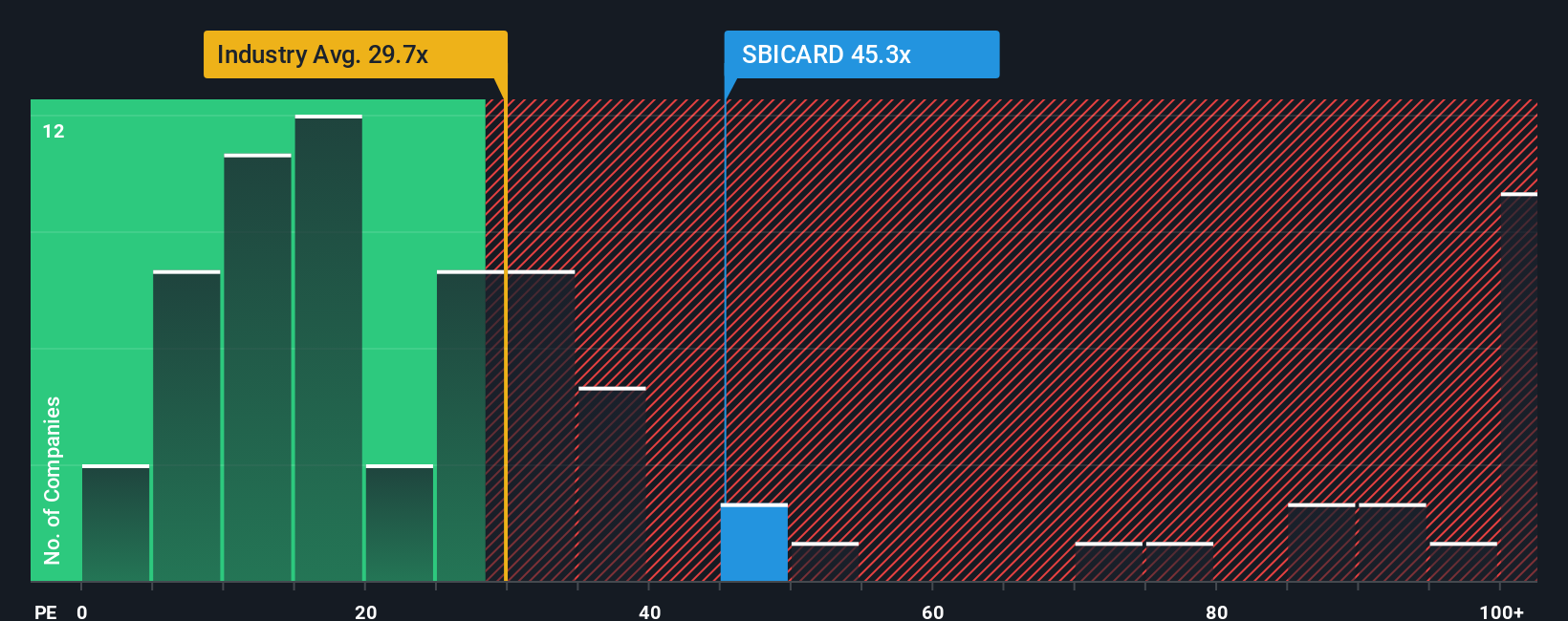- India
- /
- Consumer Finance
- /
- NSEI:SBICARD
With SBI Cards and Payment Services Limited (NSE:SBICARD) It Looks Like You'll Get What You Pay For
With a price-to-earnings (or "P/E") ratio of 45.3x SBI Cards and Payment Services Limited (NSE:SBICARD) may be sending very bearish signals at the moment, given that almost half of all companies in India have P/E ratios under 28x and even P/E's lower than 16x are not unusual. Although, it's not wise to just take the P/E at face value as there may be an explanation why it's so lofty.
SBI Cards and Payment Services hasn't been tracking well recently as its declining earnings compare poorly to other companies, which have seen some growth on average. It might be that many expect the dour earnings performance to recover substantially, which has kept the P/E from collapsing. You'd really hope so, otherwise you're paying a pretty hefty price for no particular reason.
See our latest analysis for SBI Cards and Payment Services

What Are Growth Metrics Telling Us About The High P/E?
In order to justify its P/E ratio, SBI Cards and Payment Services would need to produce outstanding growth well in excess of the market.
Retrospectively, the last year delivered a frustrating 22% decrease to the company's bottom line. This means it has also seen a slide in earnings over the longer-term as EPS is down 4.0% in total over the last three years. Therefore, it's fair to say the earnings growth recently has been undesirable for the company.
Looking ahead now, EPS is anticipated to climb by 33% each year during the coming three years according to the analysts following the company. That's shaping up to be materially higher than the 19% per annum growth forecast for the broader market.
With this information, we can see why SBI Cards and Payment Services is trading at such a high P/E compared to the market. Apparently shareholders aren't keen to offload something that is potentially eyeing a more prosperous future.
The Final Word
We'd say the price-to-earnings ratio's power isn't primarily as a valuation instrument but rather to gauge current investor sentiment and future expectations.
As we suspected, our examination of SBI Cards and Payment Services' analyst forecasts revealed that its superior earnings outlook is contributing to its high P/E. At this stage investors feel the potential for a deterioration in earnings isn't great enough to justify a lower P/E ratio. It's hard to see the share price falling strongly in the near future under these circumstances.
Having said that, be aware SBI Cards and Payment Services is showing 2 warning signs in our investment analysis, and 1 of those can't be ignored.
If you're unsure about the strength of SBI Cards and Payment Services' business, why not explore our interactive list of stocks with solid business fundamentals for some other companies you may have missed.
New: Manage All Your Stock Portfolios in One Place
We've created the ultimate portfolio companion for stock investors, and it's free.
• Connect an unlimited number of Portfolios and see your total in one currency
• Be alerted to new Warning Signs or Risks via email or mobile
• Track the Fair Value of your stocks
Have feedback on this article? Concerned about the content? Get in touch with us directly. Alternatively, email editorial-team (at) simplywallst.com.
This article by Simply Wall St is general in nature. We provide commentary based on historical data and analyst forecasts only using an unbiased methodology and our articles are not intended to be financial advice. It does not constitute a recommendation to buy or sell any stock, and does not take account of your objectives, or your financial situation. We aim to bring you long-term focused analysis driven by fundamental data. Note that our analysis may not factor in the latest price-sensitive company announcements or qualitative material. Simply Wall St has no position in any stocks mentioned.
About NSEI:SBICARD
SBI Cards and Payment Services
A non-banking financial company, provides credit cards to individual and corporate customers in India.
High growth potential with questionable track record.
Similar Companies
Market Insights
Community Narratives



